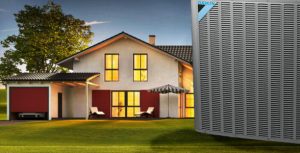What Size of AC Unit Do I Need?
The best part of hot summer days is being able to stay out of the heat in your comfy home AC. Well, it might not be the best part for everyone, but having a cool home to come back to after a day roasting in the sun is a fantastic feeling. If you live in the Southern half of the states, this becomes a year-round necessity. To make sure your home stays cool, you need to know what size of AC unit you need.
It can be a real bummer if the inside of your home is just as hot as the world outside. It’s even worse if your AC breaks down in the middle of a hot season.
If your AC isn’t doing the trick or isn’t lasting as long as it should, it might not be the right size for your home. So what is the right size for an AC unit and how do you find it?
Well, it depends on a ton of variables which we will explain in this post.
Let’s first talk about why the right size is important and what you want to avoid.
Problems with Purchasing The Incorrect Size Air Conditioner
You can’t just get an air conditioner that is bigger than what you actually need. Bigger is not always better. Likewise, getting an air conditioner that is too small will not cut it. Either way, you’re looking at spending more money on energy and repairs.
Too Big
You might think that getting an air conditioner that is bigger than what you actually need is great. It’ll cool your house down no matter what. Sure, but probably more than you want. A lot more.
It’s going to provide too much cooling to your home, too quickly. Your thermostat won’t be able to catch up. This will cause uneven temperatures throughout your home. Not to mention that this will cost you money on the excess energy this uses.

An oversized AC unit will also short-cycle. It will turn on, blast some cold air, and turn off quicker than normal. ACs are not designed to run like this and it will damage the equipment. Meaning more frequent repairs and increasing the chances of a breakdown in summer.
Too Small
An AC unit that is too small is going to have problems too, but just the extreme opposite of the large unit. It’s going to be running forever. It cannot cool your home effectively because it just doesn’t have the power to cover all the space needed. This is going to be using unnecessary energy because it’ll always be on.
The constant running is also not healthy for an AC system. If a unit is too small, it’s going to wear itself down quickly. This means a severaly shortened lifespan and repairs or a total replacement well before it should be necessary.

What is a BTUh?
In simplest terms, the BTUh tells you the size of the AC unit. The British Thermal Unit (BTU) is the basic indicator of how much cooling power that AC units have. BTUh is British Thermal Units per hour, and that measures how much energy an AC unit uses to remove heat from your home in an hour. 12,000 BTUh is equal to a ton in terms of AC units. AC units are then sized in tons from 1 to 5, with increments for every half size.
So when you ask “what size air conditioner do I need,” you could also ask “what tonnage of air conditioner do I need?”
How Do BTUs Affect AC Unit Size?
It’s recommended that you have 20 BTUh per square foot. This rule is not set in stone and it varies a lot, but works to get a baseline estimate. This can be done by taking the square footage of your home, multiplying it by 20, then dividing it by 12,000. For example, if your home is 1,500 square feet, then this is what it will look like:
(1,500 x 20) / 12,000
That should give you an answer of 2.5 or 2.5 tons. So why do some 1,500-square-foot homes have AC units that are 2 or 3 tons? Does the formula actually matter?
What Things Affect the Size of Air Conditioner I Need
While knowing the square footage is essential to get a basic idea, it’s not the definitive answer. There are a bunch of factors that need to be considered.
SEER
The Seasonal Efficiency Energy Ratio plays a big impact on how your AC unit operates. More efficient ACs typically use less energy to cool your home. The higher the SEER rating, the more efficient the unit is. When you’re thinking about what size conditioner you need, you should also consider what SEER air conditioner you want.
Home Layout And Condition
How your home was built and laid out determines how air flows through your home. That also determines how effectively an air conditioner can cool your home. For example, it’s going to be a lot easier to cool a house with many rooms in a northern climate than an open design interior in a southern climate.

- Preexisting Ductwork
- Quality of Insulation
- The Number of Windows and Sun Exposure
- Number of Household Members
- Heat Generating Appliances
- Local Climate
- Interior Layout
How Do I Get the Right Size Air Conditioner For Sure?
Now we know what determines what size air conditioner we need. How do we actually apply that to the calculation from earlier? To find the answer, you need a load calculation of some sort.
Load Calculation
These are sometimes referred to as Manual J, Block Load, or Peak Load Calculations. There are more of these formulas out there. Those three are just some of the most common ones you’ll see. Some of them use a computer program to get a very specific answer. At Advantage, we use a computer-assisted block load calculation because we find it yields the most accurate result.
A sales professional can perform this calculation after inspecting your home. They can usually do it pretty quickly and it will give you an exact answer what size of air conditioner you need. That way, you’re not paying for an AC that will not keep your home comfortable or having to drop cash on repairs every 5 years.
Who Are Advantage Heating and Air Conditioning
We are your local HVAC Experts out of Salem, Oregon. We hope this article has given you the information you need to make an educated decision about purchasing your new AC system. If you have questions about HVAC systems, please check out our other blog posts. If you want to know who we are and how we can help, please visit our website and follow us on social media. We’ll be here when you need us.







